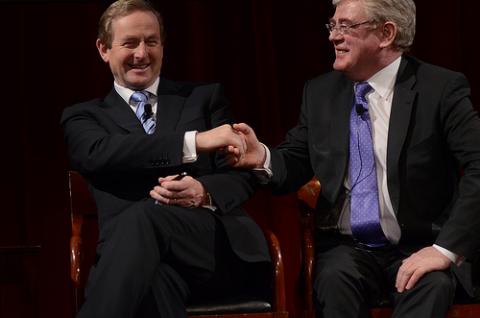Time to depersonalise party politics

Essentially, the TD you elect does not matter. They have no power. So why continue with the charade of electing individuals - why not just vote for parties? By Philip O'Connor.
Joe Costello's car-crash appearance on Tonight With Vincent Browne was another fine example of the capacity of our politicians to delude themselves.
His assertion that their first year in government had seen more of Labour's way than Frankfurt's way will have come as news to many - not least those in Frankfurt.
Or, for that matter, in Ireland.
Regrettably, and contrary to Joe's assertions, it hasn't been Labour's way at all, as they have repeatedly laid down and played dead in the face of the troika and their senior partners in government, Fine Gael.
All of this would be irrelevant had it not been for the mandate on which they were elected, and which was the polar opposite of what they have delivered - no more money for the banks, sharing the burden with the bondholders, and protecting the weakest in society from the most savage cuts.
Nothing is heard from Labour's elected representatives - those who stood on the doorsteps and asked Irish people for their votes on that basis. Indeed, the lack of dissent from the ranks is worn almost as a badge of honour, rather than the worrying portent of political passivity that it is.
But perhaps it should come as no surprise. Labour's behaviour has shown us what we already knew to be true from Fianna Fáil's dominance of the Irish political landscape for so many years - the party comes before everything.
Essentially, who you elect does not matter. They have no power.
Once they get into Leinster House the overwhelming majority of them will toe the party line until the next time they come looking for your vote. Those who do dissent will be unlikely to be chosen as candidates to represent the party again.
So why continue with this charade? Why have a name on a ballot paper at all, if they have no power?
Why not simply put an X beside the name of whatever party you want to see elected?
Then, when the mandates are counted up, let the parties appoint whatever yes men and women they please.
If nothing else, it would at least remove the indignity of forcing these individuals to almost instantaneously break election promises given to voters in return for their ballots.
The de-personalisation of the Irish democratic system might also lessen the effect of the parish pump on Irish politics, in that it would focus more on the party than the individual.
We could then spend our time dissecting the ideas and policies of the parties (not that there is much difference between them), rather than individual politicians of little or no consequence.
Perhaps then we would find out exactly what "Labour's way or Frankfurt's way" actually meant; at the time, amidst all the clamour of "Gilmore for Taoiseach", we seemingly didn't realise that they were one and the same.
Indeed, Joe Costello only made this clear to us last night as he attempted to spin about a string of what he perceived to be Labour successes on Tonight with Vincent Browne. None of them were recognisable from their election manifesto.
The last time I wrote about the Labour party, Joanna Tuffy TD insisted that she didn't spin - fascinating then that Joe trotted out exactly the same arguments on TV3 that Joanna did in her rebuttal of my criticism of their spinelessness. Coincidence? I think not.
Given Joanna's insistence that she fights the good fight internally, it will be interesting to see what comes out of the Labour party conference this weekend.
We can probably expect the cult of personality to continue - seeing as the Labour party doesn't seem to know what it stands for anymore, it's probably the safest route for them to take. {jathumbnailoff}
Philip O’Connor is an Irish writer, journalist, producer and communications professional based in Stockholm, Sweden.
